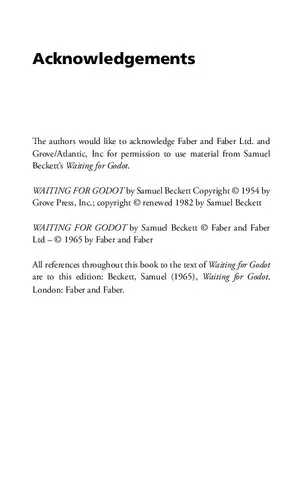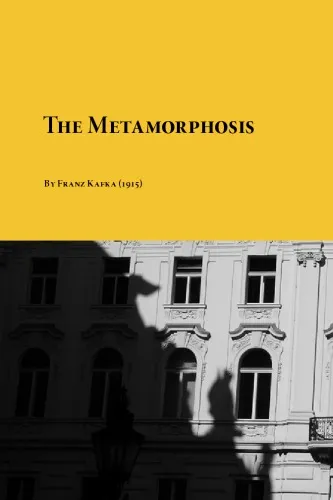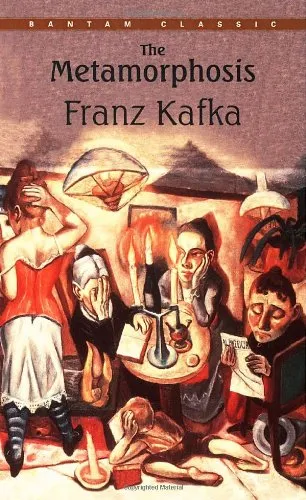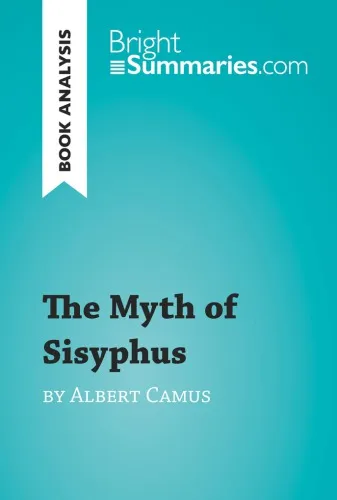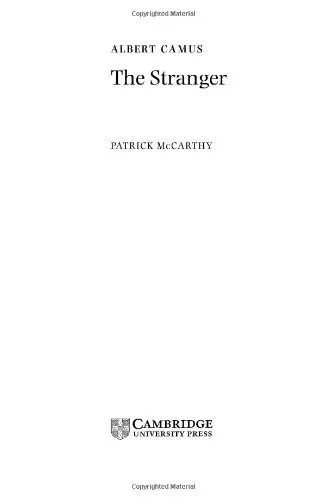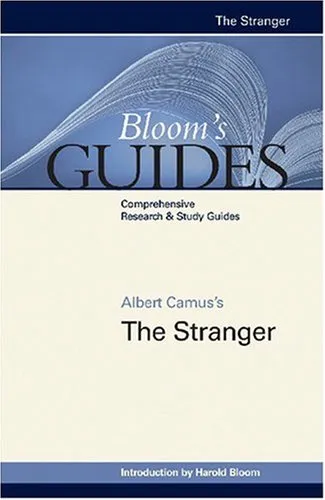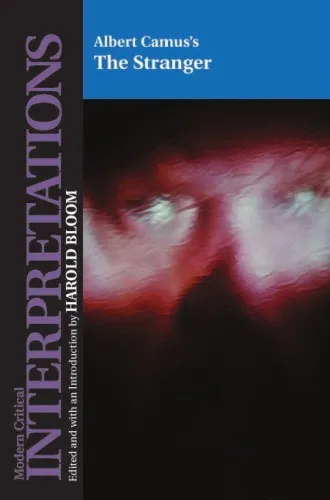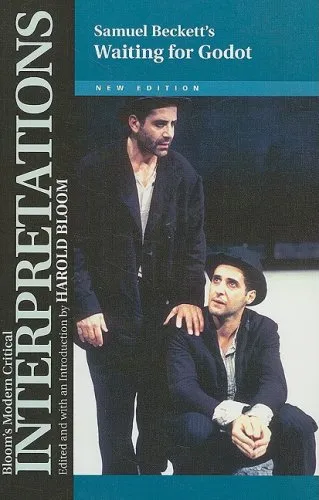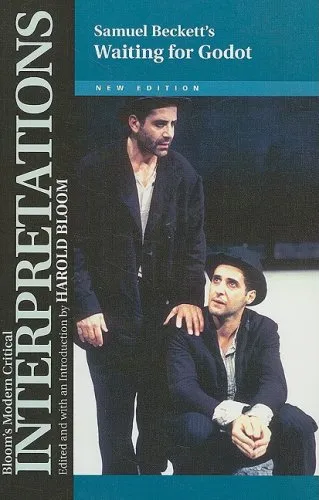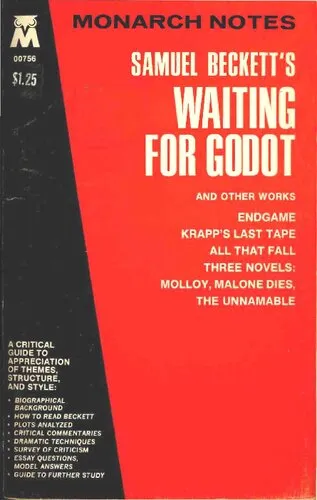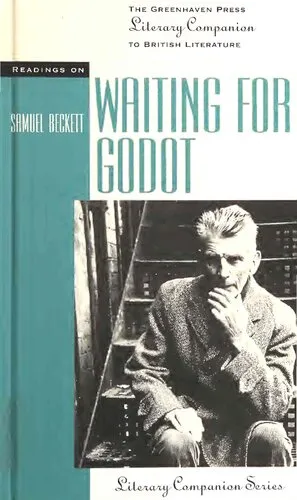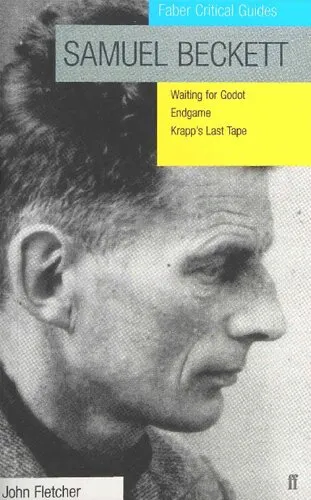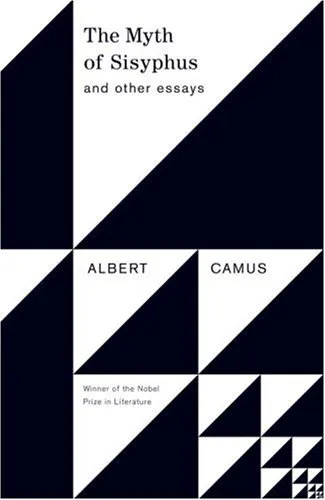Samuel Beckett's Waiting for Godot
4.5
بر اساس نظر کاربران

شما میتونید سوالاتتون در باره کتاب رو از هوش مصنوعیش بعد از ورود بپرسید
هر دانلود یا پرسش از هوش مصنوعی 2 امتیاز لازم دارد، برای بدست آوردن امتیاز رایگان، به صفحه ی راهنمای امتیازات سر بزنید و یک سری کار ارزشمند انجام بدینRelated Refrences:
مقدمهای بر کتاب «در انتظار گودو» اثر ساموئل بکت
کتاب «در انتظار گودو» اثری برجسته در تاریخ ادبیات معاصر و یکی از مهمترین آثار درام در قرن بیستم است. این نمایشنامه توسط ساموئل بکت، نویسنده ایرلندی، نوشته شده و این اثر نه تنها به خاطر سبک نوآورانهاش، بلکه به دلیل موضوعات عمیق و فلسفیاش مورد توجه قرار گرفته است.
خلاصهای جامع از کتاب
نام اثر «در انتظار گودو» داستان دو شخصیت به نام استراگون و ولادیمیر است که در یک فضای خالی و بیانتهای بیرونی منتظر شخصی به نام گودو هستند. این انتظار، که هیچگاه به نتیجه نمیرسد، تمام فضای نمایشنامه را شکل میدهد. این دو شخصیت با گفتگوهای طولانی درباره مسائل انتزاعی و گاه ناپیوسته سعی در پر کردن این خلاء دارند. حضور دیگر شخصیتها مانند پوتر و لاکی به پیچیدگی این اثر میافزاید و سوالاتی درباره معنی زندگی و هدف انتظار را مطرح میکند.
نکات کلیدی
- انتظار به عنوان یک تم محوری در داستان که به مخاطب مفهوم بیپایانی و بیهدف بودن زندگی را یادآوری میکند.
- استفاده از زبان و دیالوگ برای بیان ابهامات و پیچیدگیهای ذهن انسان.
- ترکیبی از طنز تلخ و تراژدی که برداشتهای متفاوتی از امید و ناامیدی را ارائه میدهد.
نقل قولهای معروف از کتاب
"هیچ چیزی برای انجام دادن نیست، تنها انتظار کشیدن است."
"آیا میدانیم برای چه چیزی منتظریم؟ گودو چیزی غیرمنتظره است که شاید هرگز نیاید."
چرا این کتاب اهمیت دارد
«در انتظار گودو» به عنوان یکی از شاهکارهای تئاتر ابسورد شناخته میشود. اهمیت این اثر در تواناییاش برای به تصویر کشیدن موضوعات فلسفی چون وجود، معنا و گذر زمان بدون وابستگی به ساختار داستانی متعارف است. بکت به زیبایی مفهوم پوچی را به تصویر میکشد و از طریق دیالوگهای به ظاهر ساده، خواننده را به تأمل در مورد زندگی و ذات انسان دعوت میکند. به همین دلیل است که این اثر همواره در محافل ادبی و هنری مورد بحث و بررسی قرار میگیرد و الهامبخش نسلهای آینده هنرمندان است.
Introduction to 'Samuel Beckett's Waiting for Godot'
Welcome to an insightful exploration of one of the most enigmatic plays of the 20th century, Samuel Beckett's "Waiting for Godot." As a pivotal work in the Theatre of the Absurd, Beckett's masterpiece invites readers and audiences into a world where two characters, Vladimir and Estragon, engage in an endless wait for someone named Godot. This guide will delve into the depths of the play, offering a detailed summary, key takeaways, famous quotes, and an explanation of why "Waiting for Godot" remains a significant cultural and philosophical work.
Detailed Summary of the Book
"Waiting for Godot" is a play structured into two acts, both of which unfold in the same setting – a desolate roadside with a single tree. The narrative revolves around two main characters, Vladimir and Estragon, who are bound by their mutual dependence yet disconnected by their existential dilemmas. They engage in various conversations and activities to pass the time while awaiting the arrival of the mysterious Godot, who ultimately never appears. The play explores themes of existential uncertainty, the human condition, and the passage of time, emphasizing the absurdity of life.
In Act I, Vladimir and Estragon's discussions are interrupted by the arrival of Pozzo and Lucky, who introduce themes of power and servitude. Pozzo exercises control over Lucky, who rarely speaks but delivers a lengthy monologue when prompted, showcasing the chaos and turmoil of human thought. The act concludes with a young boy delivering a message that Godot will not come today but perhaps tomorrow, leaving the protagonists in a state of perpetual anticipation.
Act II mirrors the first, maintaining the cyclical nature of the play. The interactions between Vladimir and Estragon continue with subtle variations, illustrating the relentless passage of time without progression. Pozzo and Lucky return, appearing altered by time themselves, reinforcing the themes of change and stasis. As the curtain falls, the promise of Godot’s arrival remains unfulfilled, underscoring Beckett’s depiction of hope and despair in the human experience.
Key Takeaways
Samuel Beckett's "Waiting for Godot" is not merely a play about waiting; it is a profound exploration of the existential questions that haunt humanity. Here are some key takeaways from the play:
- **Existentialism and Absurdity**: The play epitomizes the Theatre of the Absurd, highlighting the senselessness and lack of purpose in human existence.
- **Hope and Despair**: Through the endless wait for Godot, Beckett illustrates the precarious balance between hope for the future and the despair of the present.
- **Time and Memory**: The repetitive structure and dialogue underscore the fluidity of time and the unreliability of memory and experience.
- **Human Relationships**: The complex bond between Vladimir and Estragon reflects the need for companionship in the seemingly isolated journey of life.
Famous Quotes from the Book
"Nothing to be done."
"They give birth astride of a grave, the light gleams an instant, then it's night once more."
"We are all born mad. Some remain so."
Why This Book Matters
"Waiting for Godot" is more than a cornerstone of modern drama; it is a critical mirror reflecting the human psyche. The play's enduring relevance lies in its ability to articulate the universal anxieties and uncertainties of life. Beckett’s work challenges audiences to confront the intrinsic absurdity of existence and the endless search for meaning, resonating across generations. It remains a testament to the power of minimalism, shrewdly using stark dialogue and simple staging to evoke profound philosophical discourse.
Understanding Beckett's intention and the subsequent impact of "Waiting for Godot" provides a lens through which to view contemporary theatre and existential philosophy. It stimulates intellectual discussion, attaching itself to themes of religion, identity, and humanity's continuous quest for fulfillment in an indifferent universe.
دانلود رایگان مستقیم
شما میتونید سوالاتتون در باره کتاب رو از هوش مصنوعیش بعد از ورود بپرسید
دسترسی به کتابها از طریق پلتفرمهای قانونی و کتابخانههای عمومی نه تنها از حقوق نویسندگان و ناشران حمایت میکند، بلکه به پایداری فرهنگ کتابخوانی نیز کمک میرساند. پیش از دانلود، لحظهای به بررسی این گزینهها فکر کنید.
این کتاب رو در پلتفرم های دیگه ببینید
WorldCat به شما کمک میکنه تا کتاب ها رو در کتابخانه های سراسر دنیا پیدا کنید
امتیازها، نظرات تخصصی و صحبت ها درباره کتاب را در Goodreads ببینید
کتابهای کمیاب یا دست دوم را در AbeBooks پیدا کنید و بخرید
1668
بازدید4.5
امتیاز0
نظر98%
رضایتنظرات:
4.5
بر اساس 0 نظر کاربران
Questions & Answers
Ask questions about this book or help others by answering
No questions yet. Be the first to ask!
